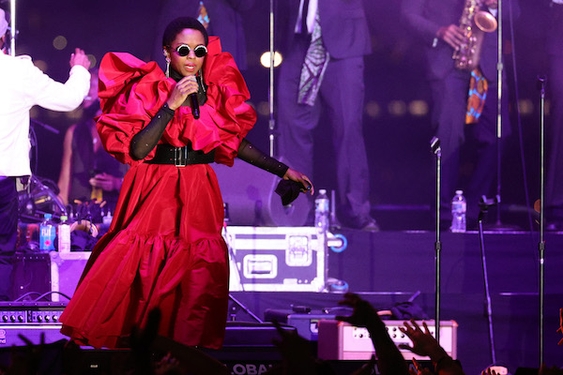Yann Tiersen returns to Los Angeles following a successful, intimate January show at CSULA to delight yet again with his transcendent amalgam of old-school French-folk, classical sensibilities and experimental rock.
Looking into the audience it’s a bit surreal. Only occasionally do French artists make a breakthrough into U.S. markets, much less an artist anchored so firmly in French sounds. And yet, here is a packed house filled with fans of all ages and every ilk, enthusiastically waiting to welcome a man best known for working an accordion like a lesser god. Once he takes to the stage, it becomes evident what the excitement is all about. The man is a rock star, whether riffing at his guitar or shredding out virtuoso compositions on the viola.
Those primarily acquainted with Tiersen’s soundtrack work on films like Amélie and Goodbye Lenin! are in for a shock as he presents fresh selections from of his new, highly experimental release, Dust Lane, and reinterpretations of old favorites reworked in the same vein. Sans trademark accordion, Tiersen bounces around from various keyboards, strapping on a series of guitars and chiseling away at his viola with the glazed-over look of a mad genius.
His new material is awash in distorted atmospheric layers that vary widely, verging on prog-rock. Tiersen wields a guitar in most unexpected ways, with melodies that are orchestral in nature, soaring like bowed strings over heavy rock beats. Tracks like “Dark Stuff” and “Dust Lane” translate particularly well to the live venue. “To the End” morphs from its early Kraftwerk-style synth opening and culminates in a monstrous soaring crescendo.
A gritty, emotional viola performance of “Sur le Fil” from Amélie is haunting against a sea of cosmic synth pulses and waves. It proves one of the definitive jaw-dropping moments of the evening as it descends into a schizophrenic finale.
“Palestine” is powerful and might have been better as a set closer than “Fuck Me,” which lacks the shocking dichotomy of innocence and vulgarity that it bears on the album, however, the set is concluded to much approval. Tiersen returns for an encore of “The Trial” with its sweet xylophone percussion and mock Theramin and “Le Quartier,” a sonic storm, with thick and furious hammering drums, buzz guitar and frenzied viola building to frightful proportions. In closing, he launches into “Amélie,” which is barely recognizable, adapted for the space-age exorcism yet no less captivating. Tiersen excels like no other at delivering wave upon wave of breathtaking moments that defy genre and reach out across cultures.
Music: Live Show Reviews
Yann Tiersen: March 11 @ The Music Box
By Natasha Desianto
Article posted on 3/23/2011
This article has been viewed 2083 times.


